Want to study French or learn it now? All language learners make errors. What are the most prevalent French-learning challenges? We’ve listed the five most difficult challenges French beginners face and a solution for each. Let’s look at the most common French learning difficulties and how to overcome them.
Problem #1: How do I determine which nouns are masculine and feminine?
Solution: Numerous European languages have gendered nouns, but not in English. Possibly, for this reason, English speakers frequently find it challenging to comprehend why any object or thing is either “masculine” or “feminine.”
How To Learn French in 30 Days: A Complete Guide
Typically, in French, masculine nouns are introduced with “le” (le frère = the brother). In contrast, feminine nouns are preceded by the article “la” (la soeur = the sister). You may wonder if there is a quicker way to learn which words are feminine and which are masculine. Unfortunately, there is no reasoning behind the gender of each term. Nevertheless, there are a few ideas that might ease the procedure.
When referring to persons, the gender of the word must match the person’s gender. Look at these examples: Le garcon, la fille, la reine, le roi.
The presence or absence of an additional “e” at the end of a word can also distinguish between masculine and feminine nouns and adjectives. For example, cousine is feminine whereas cousin is male. Or Portugais (Portuguese masculine) as opposed to Portugaise (Portuguese female)
We may sometimes infer the gender of a word based on its conclusion. There is a collection of the traditionally masculine and feminine word ends. Here are a few illustrations to get you started:
Words ending in ail – age – oir – eur – ois are masculine.
Words ending in tion, tude, aille, eille, and ance are feminine.
Problem #2: Le Subjonctif does not exist in English; thus, what and when do I need to utilize it?
Solution: Understanding when and how to utilize the subjunctive is perhaps one of the most challenging aspects of learning French. In contemporary English, the subjunctive form is relatively uncommon; thus, understanding its use in French might be difficult. The subjunctive is a grammatical mood that describes ambiguous concepts and acts, such as uncertainty, judgment, necessity, emotion, possibility and want.
You will need to memorize all the proper subjunctive verb endings and the verbs and phrases that activate the subjunctive. There is just no alternative: repetition, repetition, repetition!
This page provides a comprehensive list of idioms and verbs that activate the subjunctive.
Problem #3: I can read French, but I do not comprehend anything when I listen to a French speaker.
How can I enhance my listening abilities?
Solution: In reality, this is a typical issue since French instruction (particularly in schools) emphasizes in textbooks that listening and speaking skills are frequently overlooked. You may have a great understanding of French vocabulary and syntax, but when conversing in French, you may feel as though you do not understand anything. This may be aggravating.
7 outrageous methods for practicing a foreign language
Your brain is incapable of detecting French sounds. And the remedy to this issue is to become accustomed to hearing French. This might be accomplished by listening to podcasts, finding a conversation partner, seeing French films with English subtitles, or working one-on-one with a French instructor.

Problem #4: “Conjugations! Where should I begin? There are so many different tenses.”
Solution: Present, conditional, imperfect, passé composé… The conjugation of verbs in English is more straightforward than in French. (Don’t even bring up the irregular forms!)
Unavoidably, the only way to learn French tenses is by frequent practice: reading them aloud and pronouncing them correctly. You may also listen to verb conjugation videos if you learn better through hearing. We also suggest printing colorful postcards or flashcards for each tense since they are typically easier to remember (and are a lot easier on the eye).
Problem #5: Pronunciation difficulties. How can my pronunciation be improved?
Solution: French is a lovely language, yet proper pronunciation is frequently difficult to achieve. So numerous nasal sounds, contractions, silent letters, accents, etc…
The most accessible approach to avoid these pitfalls is to study with a French instructor who specializes in this area. They can assist you in avoiding these hazards and repairing your errors. To become proficient in public speaking, it is necessary to practice with a professional.
Language Fluent may give one-on-one assistance with pronunciation and all other challenging areas of the language.
Language Fluent specializes in private language instruction worldwide. Why not contact us if you seek individualized and customized classes to meet your unique language goals? Click here to know more











